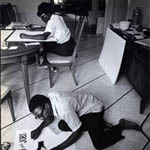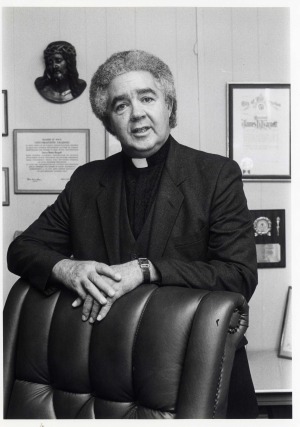By Amber L. Moore, Project Archivist, Amistad Research Center
 “Working for Freedom: Documenting Civil Rights Organizations” is a collaborative project between Emory University’s Manuscript, Archives and Rare Book Library, The Auburn Avenue Research Library on African American Culture and History, The Amistad Research Center at Tulane University, and The Robert W. Woodruff Library of Atlanta University Center to uncover and make available previously hidden collections documenting the Civil Rights Movement in Atlanta and New Orleans. The project is administered by the Council on Library and Information Resources with funds from the Andrew W. Mellon Foundation. Each organization regularly contributes blog posts about their progress.
“Working for Freedom: Documenting Civil Rights Organizations” is a collaborative project between Emory University’s Manuscript, Archives and Rare Book Library, The Auburn Avenue Research Library on African American Culture and History, The Amistad Research Center at Tulane University, and The Robert W. Woodruff Library of Atlanta University Center to uncover and make available previously hidden collections documenting the Civil Rights Movement in Atlanta and New Orleans. The project is administered by the Council on Library and Information Resources with funds from the Andrew W. Mellon Foundation. Each organization regularly contributes blog posts about their progress.
For more information about the collection described in this post, please contact the Amistad Research Center, reference [at] amistadresearchcenter [dot] org
Reverend Dr. James Hester Hargett, community advocate and civil rights activist, spent over forty years as a United Church of Christ pastor in churches located in the states of California, Hawaii, Illinois, New Jersey, and New York. His ministry focused on the recruitment of African Americans in Christian service and activities in the areas of community advocacy, education, human relations, mental health, and social justice.
 |
| Above: James Hargett, undated. Click to see a larger image. |
Hargett was born on July 24, 1930, in Greensboro, North Carolina, the son of Afro-Christian pastor Reverend Frederick A. Hargett and Florence Hester. He received a bachelor’s degree from Johnson C. Smith University (1952), a master’s degree from Yale Divinity School (1955), and a Doctor of Ministry (1975) from Colgate-Rochester Seminary. His studies at Colgate-Rochester Seminary involved work with the peoples of Ghana, Nigeria, Jamaica, Haiti, and the sea islands of South Carolina. He was ordained to ministry of the Congregational Church in 1955, and served as an associate minister of the predominately Japanese American Church of the Crossroads United Church of Christ (UCC) in Honolulu from 1955 to 1958. He was the first African American minister called to serve a Protestant-established church in Hawaii.
In 1958, he accepted the call to serve as minister of the Congregational Church of Christian Fellowship in Los Angeles, California, where he built the church membership and actively participated in the civil rights movement. He marched from Selma to Montgomery, Alabama, with Dr. Martin Luther King Jr. and served as his west coast representative of the Southern Christian Leadership Conference (SCLC). After King’s assassination, Hargett organized a star-studded fund raising event in Hollywood, which raised $450,000 for the SCLC. During his eleven years of ministry in Los Angeles, Hargett also developed the Central City Community Mental Health Clinic for the poor; the Transport-A-Child program, which provided transportation for students in overcrowded schools; and the Project Open Future program focused on academic enrichment for minority students.
In 1969, Hargett moved to New York to become the Secretary for Black Ministries of the United Church of Christ. For five years, he recruited, educated, and placed African American ministers in national and international positions with United Church of Christ churches. He worked closely with Vanderbilt and Duke Divinity Schools in the development of curriculum addressing the concerns and needs of African American seminarians. He also conducted a study on the financial needs of Black churches in the United Church of Christ. In 1975, he accepted the call as co-pastor at the Livingston Avenue United Church of Christ in New Brunswick, New Jersey, a predominately German American church, for eighteen months.
In 1977, he was called to serve as senior minster at the Congregational Church of Park Manor in Chicago, Illinois. In this position, Hargett was responsible for guiding a large and affluent African American church towards administering to the needs of the minority community. He was on the board of directors for the “One Church, One Child” program, which promoted African American adoptions with the help of local churches, as well as president of the Friends of Chicago Public Library (1982-1983).
After nine years in Chicago, Hargett moved to San Diego, California, in 1986 to serve as minister of the Christian Fellowship Congregational Church, UCC where he remained until retiring in 1997. In San Diego, his ministry focused on “empowering the African American constituency of the United Church of Christ to engage in their own missionary efforts.” He started the Children’s Care Center and brought the “One Child, One Church” program to San Diego. He also taught at California State College-Northridge, Douglas College, and Rutgers University. He served as a trustee of Johnson C. Smith University, a member of the Yale Divinity School Alumni Council, on the Board of Directors of the Los Angeles Urban League, and the Advisory Board of the Sickle-Cell Anemia Foundation.
Rev. Dr. Hargett married Dr. Louilyn Funderburk in 1954. The couple has three children, Meloni, Darryl, and Hester.
The Amistad Research Center received funding from The Council on Library and Information Resources (CLIR) Cataloging Hidden and Special Collections Program to process nine manuscript collections documenting Civil Rights era organizational history. The James H. Hargett papers were processed under the CLIR grant.

There is a correction needed in this printed bio.
1986 Rev. Dr. James H. Hargett moved to Los Angeles, Ca., in 1986 where he became the Senior Pastor of The Church of Chrustian Fellowship, United Church of Christ.
Submitted by;
Anita(Hawkins)Sparkman-Hopkins, a former member of Church of Christian Fellowship
From1962-1969
There is a correction needed in this printed bio.
1986 Rev. Dr. James H. Hargett moved to Los Angeles, Ca., where he became the Senior Pastor of The Church of Chrustian Fellowship, United Church of Christ.
Submitted by;
Anita(Hawkins)Sparkman-Hopkins, a former member of Church of Christian Fellowship
From1962-1969